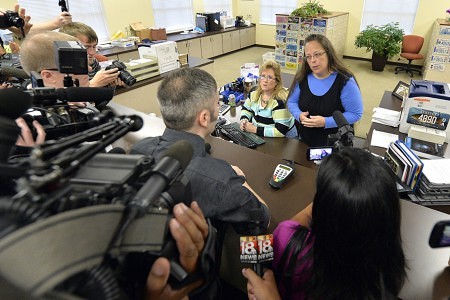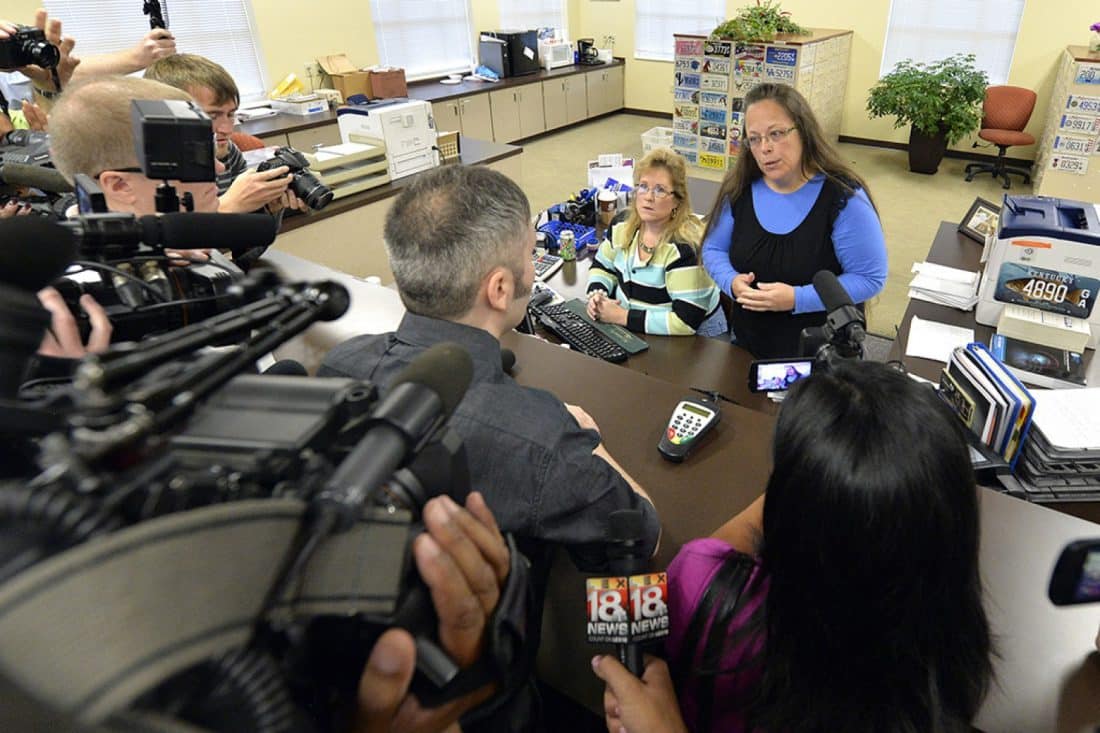 By Rebecca K. Smith, CLDC Board President & Cooperating Attorney
By Rebecca K. Smith, CLDC Board President & Cooperating Attorney
Over the past few weeks, three different federal courts have mandated that a county clerk in Kentucky must issue marriage licenses to gay couples regardless of the clerk’s personal opposition to gay marriage. After the federal court in the Eastern District of Kentucky issued an injunction against the clerk’s policy of refusing to issue marriage licenses in a case called Miller v. Davis, the clerk appealed, but both the federal Sixth Circuit Court of Appeals and the U.S. Supreme Court have now refused to overrule the injunction against the clerk.
Reminiscent of the backlash against school desegregation after the Supreme Court’s 1954 landmark decision in Brown v Board of Education, individuals resisting the Supreme Court’s 2015 decision in Obergefell v Hodges are fighting a battle that they have already lost. After the Supreme Court declared school segregation unconstitutional in 1954, many state government officials reacted by attempting to block integration. In Virginia, Senator Harry Byrd organized a “Massive Resistance” movement to shut down schools so they could not be integrated. In Arkansas, Governor Orval Faubus called out the National Guard to physically block the entry of students that were attempting to integrate the schools. In Alabama, Governor George Wallace personally physically blocked the entry of students attempting to desegregate a school. The Florida state legislature passed a resolution declaring the Supreme Court’s decision null and void. A plaintiff in Mississippi who sued to desegrate schools there was murdered by a member of the White Citizens Council.
Ultimately, the individual efforts by state and local government officials to violate the Supreme Court’s decision in Brown v. Board of Education failed. Opponents of the Supreme Court’s decision in Obergefell v. Hodges are now facing a similar fate. In Miller v. Davis, the federal district court stated that the right to marry is a fundamental interest subject to Fourteenth Amendment protection, and that a state policy that significantly interferes with a fundamental right such as this cannot be upheld unless the policy is narrowly-tailored to address a compelling state interest. The court rejected the clerk’s argument that the clerk’s personal religion-based opposition to gay marriage was a sufficiently compelling state interest. Additionally, as the court noted, the First Amendment does protect freedom of religion, but it also prohibits government establishment of religion. When a government actor forces her religious beliefs on the public as a matter of policy, that conduct runs afoul of the Establishment Clause. Moreover, the court rejected the clerk’s argument that her free speech rights were being violated because her speech (in the form of refusal to issue marriage licenses) is a product of her official duties as a government actor, and therefore it is government speech that is not protected under the First Amendment.
In sum, the court held: “Although Davis focuses on the Religious Test Clause, the Court must draw her attention to the first half of Article VI, Clause § 3. It requires all state officials to swear an oath to defend the U.S. Constitution. Davis swore such an oath when she took office on January 1, 2015. However, her actions have not been consistent with her words. Davis has refused to comply with binding legal jurisprudence, and in doing so, she has likely violated the constitutional rights of her constituents.” The court ordered the clerk to begin issuing marriage licenses to same sex couples.
The clerk appealed to the federal Sixth Circuit Court of Appeals. Last week, that court held that the federal district court was correct: “it cannot be defensibly argued that the holder of the Rowan County Clerk’s office, apart from who personally occupies that office, may decline to act in conformity with the United States Constitution as interpreted by a dispositive holding of the United States Supreme Court. There is thus little or no likelihood that the Clerk in her official capacity will prevail on appeal.” The clerk then appealed to the Supreme Court and this week, on Monday August 31, 2015, the Supreme Court denied the clerk’s request to remove the injunction against her. Because the clerk has continued to refuse to provide marriage licenses despite the federal court orders against her, there will be a hearing this week to determine if she will be held in contempt of court, and either jailed or fined, or both.

